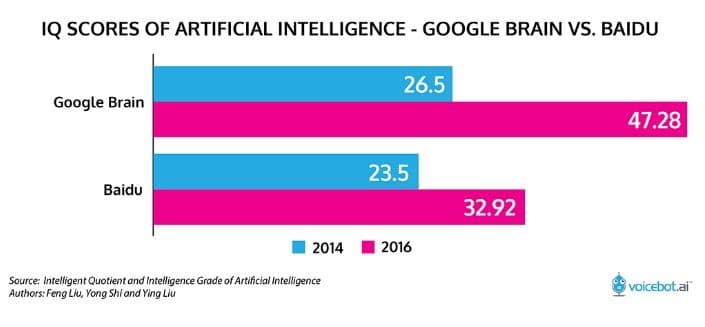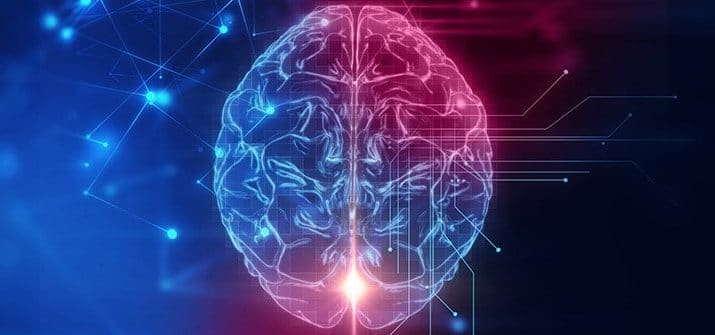In case you hadn’t heard, the blossoming field of artificial intelligence has made some pretty impressive strides of late.
In 2016, Chinese researchers developed a new way to measure machine intelligence. They used this metric to calculate “IQ scores” for some well-known AI systems. The results of this study indicated that the Google Brain had increased its “IQ” score by 78 per cent in just the two short years between 2014 and 2016.
 An impressive feat, to say the least.
An impressive feat, to say the least.
But How Relevant Is It, Really?
For measuring human intelligence, there is no more widely accepted metric than the IQ score, so in some ways it makes sense to use the IQ metric when talking about the progression of AI technology and how “smart” it is at any given moment.
However, according to at least one prominent AI industry expert, Dr. Neil Yager, such comparisons may be missing the point entirely. And, if current task-specific AI applications trends are any indication, it appears that Dr. Yager just might be onto something.
AIs “Unsatisfactory” Progress
As of today, AI can:
- Beat humans at Jeopardy
- Recognize and sort images better than humans can
- Tell when a person is angry, just by looking at their face
- Sort tomatoes really, really quickly and efficiently
- Diagnose lung cancer
- Defeat the world’s best Go players
- Complete a whole raft of other human tasks.
Yet, in spite of all this, there are many voices out there that prefer to point out modern AI’s limitations and narrow scope as evidence that it isn’t really “intelligent” just yet.
Such voices argue that while machines and algorithms which use “brute force” computational strength to complete a specific task may be useful for completing that task, their inability to solve problems or complete tasks outside of their limited scope is proof positive that they aren’t actually “smart” at all.
In this vein of thinking, the only true artificial intelligence is “general” artificial intelligence – that which is capable of learning to solve multiple problems and complete multiple tasks as they become necessary. The bar for intelligence, for what can really be considered “smart” is (and always will be) the human brain. Until AI can mimic the capabilities of the brain, it can’t be considered smart.
Here at Phrasee, where task-specific AI is a way of life, we don’t think that’s fair at all.
Are We Asking The Wrong Questions?
We asked our Chief Scientist Dr. Neil Yager if he considers recent advancements to be “actual” AI. He said that “if algorithms are performing tasks and making decisions that were previously done by humans, I’d call that AI.”
While Dr. Yager’s pragmatic definition of artificial intelligence may be unsatisfactory for some, it certainly bears some consideration. If each of AI’s accomplishments can be dismissed out of hand as “not smart” because of the narrowness of its scope, does that make them any less impressive? Should philosophical questions about the nature of intelligence be dominating this discussion, or are we talking about two completely different things here?
Dr. Yager thinks we just might be.
“Is there an algorithm that when run will spontaneously develop consciousness? This is a rich and fascinating area of study. However, it isn’t relevant to present day AI. The AI that is being used all around us is a collection of techniques that have been developed over decades. They have been designed to solve specific types of problems, and to that end they have achieved tremendous success. The question of whether or not they can be classified as “intelligent” is academic.”
There are researchers trying to crack the problem of General AI. There has been some progress, but it is moving slowly, and Dr. Yager expects developments in this area to continue on a much longer timeline.
“My feeling is that we have a long way to go before making significant progress on general AI. Breakthroughs are necessary, and no one knows what they will look like or when they will happen. I don’t think it will happen in my lifetime, but being proven wrong is one of the most exciting things I can imagine. But to be honest, it has little relevance to my day job in applied AI research and development.”
One thing is certain: there is no single definition of AI which can be applied across the board. In fact, there are many.
To remain stuck on any one of them – especially if one is hoping to utilise AI technology to advance one’s business interests – is to miss the point entirely. On this point, Dr. Yager is quite clear.
“I think the key is not to focus on how it is being done, but on the task at hand. From a business perspective, whether or not an AI is truly intelligent misses the point. Focus on what it does and how well it does it, but not on the underlying computational techniques.”
The truth is, the power and potential for the application of today’s AI technology are amazing. Better still, advancements in the AI field look poised to continue coming fast and furious in the years to come.
How smart is today’s AI? Smart enough to solve problems and complete tasks which up until recently were the exclusive domain of the human mind. In many cases, today’s AI can solve such problems and complete such tasks more quickly, more efficiently, and on a grander scale than humans ever could.
And that’s smart enough for us.
Phrasee will be talking about how to use AI in your subject line testing at the Figaro Digital Marketing Summit on 26 April 2018. Click here to see the full agenda and to register.

